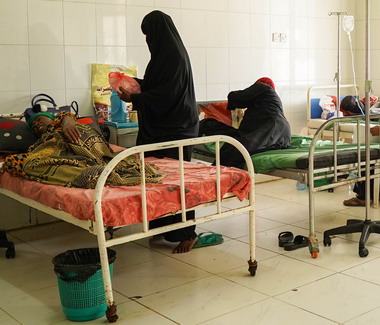 Maryam and Jamila receive treatment at a WHO-supported oncology centre in Aden
Maryam and Jamila receive treatment at a WHO-supported oncology centre in Aden
20 September 2020 – The pain of cancer patients in Yemen is being compounded by the additional burden of conflict, displacement, widespread poverty and hunger.
Jamila, a 40-year-old woman, is currently displaced due to the ongoing conflict. To add insult to injury, she has cancer.
“It’s difficult to find medicines nowadays, and the available ones are very costly. Being without income, I cannot afford them”, said Jamila, who has received free of charge cancer medicine provided by a WHO-supported cancer centre.
The ongoing conflict in Yemen has turned an already vulnerable country into the world’s largest man-made humanitarian crisis, taking away what its people need the most, including the fundamental needs, like health care. In 2020, more than 19.7 million people need health care services in Yemen while only half of Yemen’s facilities are still functioning. There are also about a total of 1.5 million currently displaced people, suffering from already existing vulnerabilities.
As the economy collapses and imports are restricted, medicines and equipment that are readily available in other countries are scarce in Yemen. As a result, treatment is available at only a fifth of Yemen’s health facilities.
Maryam, 60 years old, receives treatment at a WHO-supported oncology centre. “I have to travel for 350 km only to receive treatment. The transportation cost has skyrocketed, let alone accommodation.”
Approximately 35 000 Yemenis currently have cancer, and more than 11 000 are newly diagnosed with the disease every year. In 2016, many cancer clinics closed due to a lack of staff, medicines and equipment, creating long waiting times and forcing people to travel many miles for vital treatment. As a result, thousands face a death sentence through lack of access to medical care.
“There are so many things that people around the world take for granted, while they are beyond our reach in Yemen. As we struggle to get the most basic needs, our right to health and life is compromised,” said Maryam, who fears that her children would one day be unable to secure her treatment.
“In Yemen today, we are dealing with the real threat that patients face imminent and painful death unless we continue to receive the support that will enable us to save their lives,” stressed Dr Abdulwahab Al Nehmi, WHO Noncommunicable Diseases Officer.
WHO and partners, including the King Salman Center for Humanitarian Aid and Relief and Kuwait, are working to prioritize the procurement and delivery of supplies to cover the life-saving treatment needs for patients living with chronic, life-threatening conditions, including cancer. WHO has supported the national oncology centre with various life-saving anti-cancer medicines and chemotherapy medications, helping to save the lives of thousands of patients, and providing painkillers, such as morphine and fentanyl, to improve the quality of life for patients at advanced stages of the disease. WHO has also facilitated workshops on the early diagnosis of breast cancer, and mental health and psychosocial support for cancer patients. Thanks to the generous support of the donors, all cancer centres are currently open and providing cancer care across the country.
“Without WHO support with the cost of my treatment, I would have stayed home, waiting for death to relieve my pain,” said Maryam.








